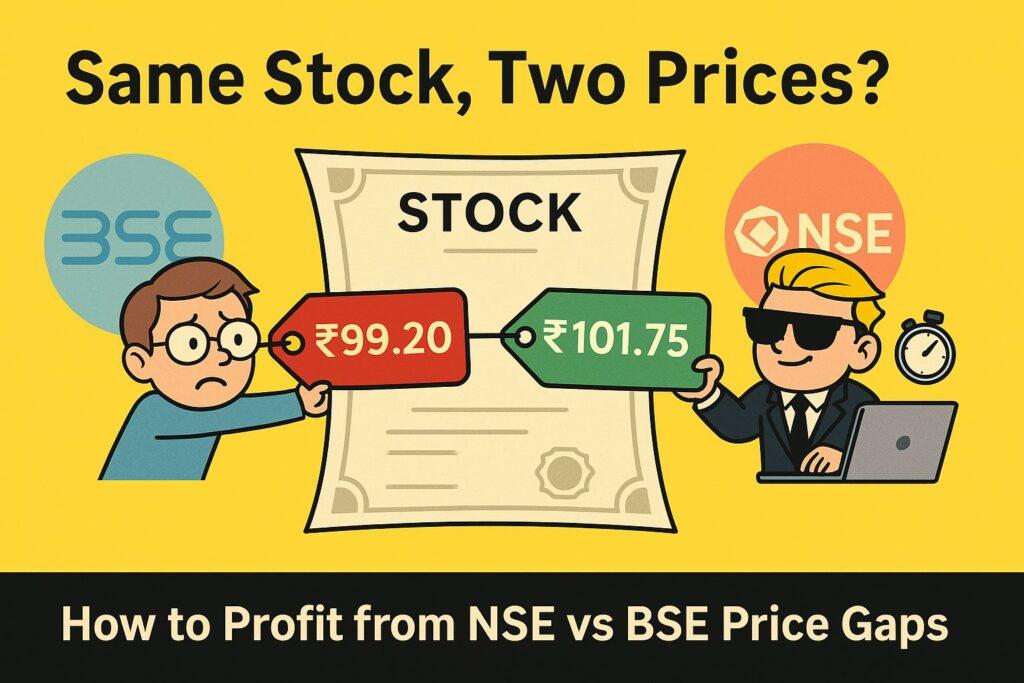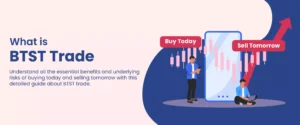At a Glance
Yes, the same stock can have different prices on NSE and BSE – welcome to the Indian stock market, where even the same share suffers from an identity crisis depending on which exchange you ask. Here’s how it works, why it happens, and how clever traders (and bots) milk this difference like it’s a free buffet.
🧨 Introduction: Same Stock, Two Personalities?
Imagine this:
Tata Motors is trading at ₹980 on NSE.
Flip over to BSE – boom – it’s ₹978.
Wait. Aren’t both literally the same stock? Same company. Same ISIN. Same fundamentals.
Yes. But different demand-supply dynamics on different exchanges can lead to what’s called…
⚖️ Price Disparity Between Exchanges.
🧠 Why This Madness Happens
Here’s why a single stock trades at two different prices:
- Liquidity Mismatch: NSE has ~90% of the volume. BSE? That introvert cousin who comes to weddings but doesn’t dance.
- Order Book Gap: Market makers, algos, and retailers all place buy/sell orders. If one side is thicker on NSE vs BSE, prices diverge.
- Latency Arbitrage: High-frequency traders capitalize on millisecond delays. They see the price on NSE tick up, rush to buy cheaper on BSE.
- Round Lot Sizes: Some institutional orders execute only on NSE due to size constraints. This causes price shifts even for retail shares.
📉 Live Example Time: Tata Power (Hypothetical)
| Exchange | Price | Volume |
|---|---|---|
| NSE | ₹430.50 | 19,23,000 |
| BSE | ₹428.90 | 1,42,000 |
That’s a ₹1.60 difference. Small? Sure. But if you buy 1,000 shares and sell instantly on NSE?
💰 ₹1,600 in seconds. Minus charges = still biryani for the week.
🤑 How to Actually Benefit – Arbitrage 101
Let’s break it down for the traders among us (or future ones):
1. Buy Low, Sell High – On Different Exchanges
- Spot a price gap: BSE ₹428, NSE ₹430.
- Buy on BSE, sell simultaneously on NSE.
- Instant Arbitrage. (If you can pull it off in time.)
⚠️ Requires same-day delivery capabilities (BTST won’t work) or arbitrage brokerage accounts that support this.
2. Use an Algo Tool or Arbitrage Scanner
- Tools like Streak, Algofox, or Chartink Custom Scans can alert you when a price difference exceeds 0.5% or whatever margin you define.
- Some traders use Python scripts + Zerodha Kite API to automate this.
3. Cross-Exchange Long/Short Strategy
- Go long on one exchange, short on the other.
- Wait for convergence. Profit.
- Think of it like betting on twins eventually wearing the same outfit.
4. Mutual Fund & ETF NAV Arbitrage
- Some ETFs (like Nippon’s PSU Bank ETF) trade at slight premiums on BSE vs NSE.
- Same applies to gold ETFs, international ETFs, and even REITs sometimes.
📦 The Catch? Costs and Chaos
Before you rush off to open 10 tabs on BSE and NSE, here’s the fine print:
- 💸 Brokerage Charges – You pay on both sides (buy + sell).
- 🔁 STT, Stamp Duty, Exchange Fees – Especially problematic when profits per trade are ₹1–₹2.
- 🕒 Execution Delay – If prices align before you execute, you’ve just donated to the exchange.
- 🚫 BTST Not Possible – You need delivery or intraday margins.
- 💻 Speed Needed – Manual traders are usually too slow. Algo boys win.
🦾 What Do The Pros Use?
- Arbitrage Engines: HFT firms run cross-exchange algo servers colocated in NSE/BSE data centers.
- Dark Pools: Institutions execute large orders via off-market deals, minimizing impact.
- Prop Desks: Professional traders use this as a low-risk strategy across 100s of trades per day.
Retail traders? You get one or two lucky snipes… if you’re fast.
🤯 Fun Fact: You Can Arbitrage IPO Listings Too
- Newly listed IPOs often open higher on NSE but trail on BSE by ₹3–₹4 for a few minutes.
- Buy on the cheaper exchange (if allowed) and sell where it’s higher.
- This works particularly in low-volume SME IPOs.
🔢 Can You Really Make Money?
Let’s math it out:
| Metric | Value |
|---|---|
| Spread | ₹1.50 |
| Quantity | 1,000 shares |
| Total Profit | ₹1,500 |
| Charges | ~₹400 |
| Net Profit | ₹1,100 (if fast + lucky) |
But if you get stuck? You might end up holding 1,000 shares bought at ₹430… that just dropped to ₹425.
🚀 What About US Stocks?
Yes, Indian ADRs like Wipro, HDFC Bank, Infosys also show price divergence vs their NSE counterpart.
Some investors use this for long-term arbitrage or hedging.
🧑⚖️ EduInvesting Verdict™
You won’t retire rich doing exchange arbitrage – unless you’re running an HFT firm in Singapore.
But for smart traders:
- It’s free money when done right
- It’s risky if you’re greedy
- And it’s impossible if you’re slow
Want to try? Start with watchlists of liquid stocks (Reliance, HDFC Bank, TCS, etc.), observe the order books, and test with small lots.
You might just snipe your way to some passive side cash 💸
✍️ Written by Prashant | 📅 July 8, 2025
Tags: arbitrage, NSE vs BSE, price difference trading, algo trading India, exchange spread, intraday ideas, EduInvesting, funny finance, stock market tips



















